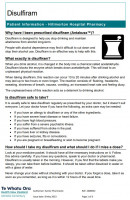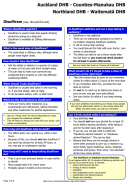If you're a frequent visitor to Healthify, why not share our site with a friend? Don't forget you can also browse Healthify without using your phone data.
Disulfiram
Also known as Antabuse®
Key points about disulfiram
- Disulfiram is used to support people with drinking problems.
- Disulfiram is also called Antabuse®
- Find out how to take it safely and the possible side effects.

Disulfiram is a medicine used to help people with drinking problems to stop drinking alcohol. It works by interfering with the way your body breaks down alcohol.
When you drink alcohol, disulfiram causes a build up of a substance called acetaldehyde that causes extremely unpleasant effects when even small amounts of alcohol are consumed. It makes you feel very sick, similar to having a bad hangover.
These unpleasant effects on your body help discourage you from drinking alcohol. This medicine doesn't reduce cravings and works better if you are also having therapy for your dependence on alcohol.
Disulfiram is also called Antabuse®.
In Aotearoa New Zealand, disulfiram is available as effervescent tablets (200 mg). It’s important that you have not consumed any alcohol for at least 24 hours before starting disulfiram.
- Always take your disulfiram exactly as your doctor has told you. The pharmacy label on your medicine will tell you how much disulfiram to take, how often to take it and any special instructions.
- The dose of disulfiram will be different for different people.
- The usual starting dose of disulfiram is 200 mg once a day.
- Depending on your response, your doctor may increase your dose to 600 mg once a day.
- Some people may start on a higher dose for a few days and then slowly reduce the dose.
Disulfiram tablets are effervescent meaning they need to be dissolved in water before taking. Add your dose to a quarter of a glass of water or fruit juice (65 mL). Stir with a spoon until the tablet(s) have dissolved and drink the full amount straight away.
- Timing: Disulfiram should be taken in the morning when you wake up, but if it causes drowsiness, it can be taken in the evening before you go to bed.
- Take disulfiram at the same time each day, either in the morning or the evening.
- You can take disulfiram with or without food.
- Missed dose: If you forget to take your dose, take it as soon as you remember. But if it's less than 12 hours before your next dose, skip the dose and just take the next dose at the usual time. Don't take double the dose.
- It's important to take it as prescribed: See tips to help you remember to take your medicines regularly.
Avoid alcohol
It’s important to avoid alcohol while you are taking disulfiram. Within 5 to 10 minutes of drinking alcohol you can experience intense flushing in your face, dizziness, increased heart rate, a throbbing headache, nausea (feeling sick), vomiting (being sick) and a feeling of difficulty in breathing. This reaction may last up to 60 minutes or longer.
- Even small amounts of alcohol can cause this reaction. This includes small amounts often found in food (eg, soy sauce, vinegar), toiletries (eg, mouthwash, hand sanitiser) and medicines (eg, cough mixture).
- Even drinks labelled ‘alcohol free’ can still contain small amounts of alcohol so you’ll need to check the label carefully.
- If you drink a large amount of alcohol while taking disulfiram it can cause a drop in blood pressure causing you to pass out and other severe reactions including convulsions.
- Make sure your family and friends know that it's important for you to not drink any alcohol.
- Depending on your dose, the effect of disulfiram causing a reaction with alcohol may take several days to develop.
- The reaction with alcohol can continue for up to 3 weeks after you’ve stopped taking disulfiram. It's important that you don’t drink alcohol for 3 weeks after stopping disulfiram.
If you drink alcohol while taking disulfiram, even if you don’t have a disulfiram-alcohol reaction then you must do one of the following:
- see your doctor immediately
- call Healthline on 0800 611 116
- call NZ Poisons Information Centre on 0800 764 766, or
- go to Accident and Emergency department at your nearest hospital or after hours medical centre.
Other things to know
Here are some other things to know when you're taking disulfiram. Other things may be important as well, so ask your healthcare provider what you should know about.
- Driving: Disulfiram can make you sleepy. Be careful when driving or using tools until you know how this medicine affects you.
- Other medicines: Disulfiram interacts with some other medicines (eg, metronidazole and sulphonylureas for diabetes), herbal supplements and rongoā Māori, so check with your doctor or pharmacist before starting disulfiram and before starting any new products.
- Monitoring: You will need blood tests to check your liver function before and every 3 to 6 months during and after you take disulfiram. Your healthcare provider will organise this with you.
- Any decision to stop should be made with your healthcare provider. Treatment with disulfiram can be from 6 weeks up to 6 months.
- Pregnant: If you become pregnant contact your doctor immediately.
- Breastfeeding: It’s not recommended to breastfeed while taking disulfiram.
Like all medicines, disulfiram can cause side effects, although not everyone gets them. Often side effects improve as your body gets used to the new medicine.
|
Side effects |
What should I do? |
|
|
|
|
|
|
|
|
Read more about medicines and side effects and reporting a reaction you think might be a side effect.
The following links provide further information on disulfiram. Be aware that websites from other countries may contain information that differs from New Zealand recommendations.
Antabuse(external link) Medsafe Consumer Information Sheet, NZ
What are zero alcohol drinks?(external link) Alcohol and drug foundation, Australia
Brochures
Disulfiram Patient information(external link) Hillmorton Hospital Pharmacy, NZ
Disulfiram(external link) Auckland/Counties Manukau/Northland/Waitematā DHBs, NZ
5 questions to ask about your medications(external link) Health Quality and Safety Commission, NZ English(external link), te reo Māori(external link)
Apps
References
- Alcohol dependence(external link) New Zealand Formulary, NZ
- Disulfiram(external link) New Zealand Formulary, NZ
- Antabuse(external link) Medsafe data sheet, NZ
- Assessment and management of alcohol misuse by primary care(external link) BPAC, NZ, 2018
- Can I drink with that?(external link) Medsafe, NZ, 2014
Brochure block

Disulfiram Patient information Hillmorton Hospital Pharmacy, NZ, 2023

Disulfiram Auckland/Counties Manukau/Northland/Waitematā DHBs, NZ, 2023

Health Quality and Safety Commission, NZ, 2019
English, te reo Māori
Credits: Healthify editorial team. Healthify is brought to you by Health Navigator Charitable Trust.
Reviewed by: Angela Lambie, Pharmacist, Auckland
Last reviewed:





